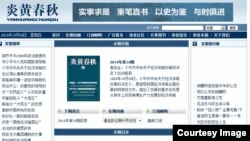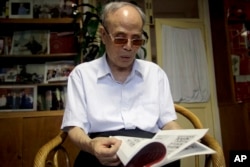The vice president of Yanhuang Chunqiu, an influential liberal magazine in Beijing, showed up at the publication’s headquarters Tuesday and demanded that its government-backed occupants vacate the premises.
The long-running reformist periodical recently announced it would cease publication after a slew of high-level sackings and imposition of new editorial leadership — part of Chinese President Xi Jinping’s latest tightening of political control of news media and, more broadly, online speech.
Publisher Du Daozheng, who founded the magazine in 1991, was recently fired by the Chinese National Academy of Arts, an organization linked to the Ministry of Culture. The academy sponsors Yanhuang Chunqiu, whose name literally translates as "China Through the Ages."
"Anyone who publishes a periodical bearing the title Yanhuang Chunqiu will have nothing to do with [the existing editorial team]," Du, who is in his 90s, announced in a public statement.
'The office is ours'
The magazine's long-standing vice president, Hu Dehua, arrived at the office with some accountants Tuesday in order to file the company's taxes. They were blocked at the door by people from the government unit assigned to reshuffle its leadership team. Tuesday was the tax-filing deadline for Chinese companies.
“Every penny we have is earned through hard work," Hu reportedly shouted at the people blocking the entrance before demanding to see their identification. "We pay taxes to the state. We are a law-abiding business! The office is ours. What rights do you have to come in?"
It was not known whether Hu — son of the late Chinese Communist Party reformist leader Hu Yaobang, whose death catalyzed the 1989 pro-democracy uprising — was ultimately successful in gaining access to the offices.
Tuesday's events came one day after more than 100 Chinese citizens, led by some of the country’s prominent scholars and writers, issued an open letter calling on citizens to rally behind the 200,000-circulation magazine for reform-minded Chinese officials.
Intellectuals' 'pitiful fate'
The open letter, whose signatories have since expanded to nearly 500, says the state-led shake-up reflects the "sad and pitiful fate of Chinese intellectuals."
"It is the only magazine that speaks the truth," the magazine's lawyer, Mo Shaoping, told Reuters. "They don't want the magazine to exist anymore."
Wu Qing, a retired English professor at Beijing’s University of Foreign Studies, described the ouster of the magazine's editorial leadership as a threat to the prospect for political reform nationwide.
"It is very important that we read about the true history, not fabricated lies," she told VOA's Mandarin service. "The magazine tells the truth, writes about the true history, makes us see more clearly why we must carry out reform, why we need the rule of law, democracy, freedom and transparency.
“Among the people, many want to voice their support [for the publication]," added Wu, a well-known Chinese feminist activist and seven-term district-level congress member. "I think what is really scary is not bad guys’ arrogance, but the extreme silence of good people.”
'Old rival'
Wang Yanjun, the magazine's deputy editor in chief, told VOA on Monday that he believed orders to purge the editorial staff had not come from the Communist Party leadership, but from the “middle,” which he described as the party’s department of propaganda.
“The party’s propaganda department is an old rival," he said. "Back in 2005, they ordered us to halt the distribution of one already-printed issue, because they didn’t approve the contents. Now they have struck again, assuming this is what the top [Communist Party] leadership wanted.”
Analysts, however, said recent events aligned closely with Xi's increasingly restrictive media policies and prior calls for local publications to serve the ruling Communist Party’s interests.
Representatives from Yanhuang Chunqiu's parent organization, the Arts Research Institute, did not answer repeated telephone calls seeking comments. China's publishing regulator, the State Administration of Press, Publication, Radio, Film and Television, also did not respond to requests for comment.
China's State Council Information Office, which oversees press communications for China's cabinet, did not immediately respond to emailed questions.
Communist Party leaders have tried to shutter the magazine 19 times in the past 25 years, one of its editors told Reuters, requesting anonymity because of the sensitive situation.
This report was produced in collaboration with VOA's Mandarin service. Hai Yan contributed reporting from Hong Kong.





